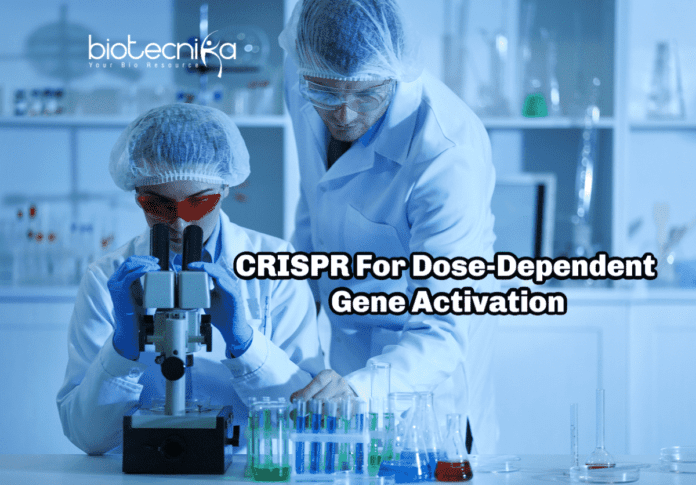CRISPR For Dose-Dependent Gene Activation
A group of scientists affiliated with several institutions in the U.S. has developed a way to use the CRISPR gene-editing technique for dose-dependent activation of gene expressions.
The team of scientists describes their technique for altering gene expression in an alternative way and how well it worked.
Prior studies have shown that gene expression can be suppressed or activated using the CRISPR/Cas9 gene-editing technology. But until now, the CRISPR technique had not been used to enable dose-dependent activation of gene expression.
CRISPR For Dose-Dependent Gene Activation- A New Approach
In this new effort by scientists, they have found a way to do just that by making use of chemical epigenetic modifiers- (CEMs) that were skillfully designed to activate desired gene expression with the help of some parts of the endogenous chromatin-activating machinery — doing, so researchers eliminated the requirement of exogenous transcriptional activators.
The new approach involved using two components; the first was Cas9, which was catalytically inactive along with the binding protein FKBP.
The second was a CEM developed with FK506. This was linked to a molecule that would interact with the desired cellular epigenetic machinery. To be more specific, they created CEM-activating molecules
that would find the gene activating mechanism, including CEM114, CEM87, and CEM88.Together, the 2 parts were used to activate gene expression in desired ways
This group of scientists tested their system by infecting HEK293T cells with a fluorescent green protein. The researchers then performed cytometry on the cells that were expressing guide RNA (g-RNA) & the inactive Cas9.
They then tested activation of the gene using a plasmid expression along with one of the three chosen Chemical Epigenetic Modifiers. Then the researchers had to wait to confirm that GFP expression was increased compared to cells that had not been treated.
CRISPR For Dose-Dependent Gene Activation- Experiment Results
The researchers closely observed the inactive Cas9 protein that was treated with the Chemical Epigenetic Modifiers to confirm that it was the CEM systems that were activating the GFP in the desired manner. In so doing, they found that treatment with CEM87 was the only test case that elevated the expression of GFP.
The scientists suggest this new technique developed by them could be useful in situations demanding for dose-dependent activations of gene expression in validation studies.






























